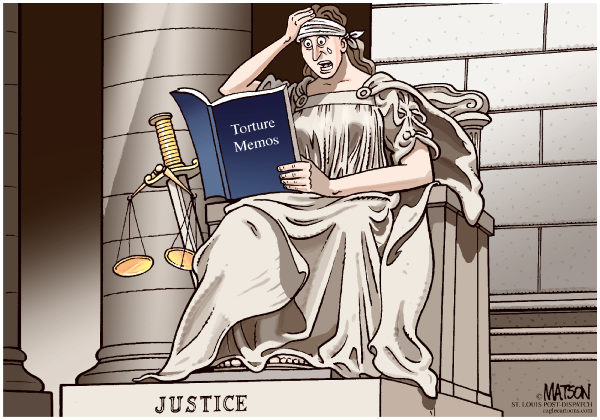Search
Recent comments
- mel warning....
6 hours 7 min ago - desecration....
8 hours 17 min ago - japan wins....
9 hours 25 min ago - nuances?....
9 hours 30 min ago - smaked by daddy....
9 hours 36 min ago - trust no-one....
11 hours 46 min ago - threesome....
11 hours 56 min ago - framing....
12 hours 56 min ago - epstein UK....
13 hours 53 min ago - toleration....
14 hours 13 min ago
Democracy Links
Member's Off-site Blogs
mock horror .....

A crucial CIA Inspector General's report from May 2004 is expected to reveal some long-hidden truths about the Bush administration's use of torture.
According to MSNBC's Rachel Maddow, "This report is sort of the big kahuna in terms of what we have been waiting to see from the government's own files on torture. That report, which is long and has been described by people who have seen it as 'sickening,' apparently stopped the torture program in its tracks."
Senator Sheldon Whitehouse (D-RI) recently warned in a speech on the floor of the Senate that almost everything we think we know about the Bush administration's torture program is wrong.
"There has been a campaign of falsehood about this whole sorry episode," Whitehouse stated. "We've been misled about nearly every aspect of this program . ... measured against the information I've been able to get access to, the storyline that we have been led to believe ... is false in every one of its dimensions."
http://rawstory.com/08/news/2009/06/11/maddow-more-sickening/
then .....
The roots of our present paralysis over what to do about detainee abuse lie in the hidden history of the CIA's program of psychological torture. Early in the Cold War, panicked that the Soviets had somehow cracked the code of human consciousness, the Agency mounted a "Special Interrogation Program" whose working hypothesis was: "Medical science, particularly psychiatry and psychotherapy, has developed various techniques by means of which some external control can be imposed on the mind/or will of an individual, such as drugs, hypnosis, electric shock and neurosurgery."
All of these methods were tested by the CIA in the 1950s and 1960s. None proved successful for breaking potential enemies or obtaining reliable information. Beyond these ultimately unsuccessful methods, however, the Agency also explored a behavioral approach to cracking that "code." In 1951, in collaboration with British and Canadian defense scientists, the Agency encouraged academic research into "methods concerned in psychological coercion." Within months, the Agency had defined the aims of its top-secret program, code-named Project Artichoke, as the "development of any method by which we can get information from a person against his will and without his knowledge."
This secret research produced two discoveries central to the CIA's more recent psychological paradigm. In classified experiments, famed Canadian psychologist Donald Hebb found that he could induce a state akin to drug-induced hallucinations and psychosis in just 48 hours - without drugs, hypnosis, or electric shock. Instead, for two days student volunteers at McGill University simply sat in a comfortable cubicle deprived of sensory stimulation by goggles, gloves, and earmuffs. "It scared the hell out of us," Hebb said later, "to see how completely dependent the mind is on a close connection with the ordinary sensory environment, and how disorganizing to be cut off from that support."
During the 1950s, two neurologists at Cornell Medical Center, under CIA contract, found that the most devastating torture technique of the Soviet secret police, the KGB, was simply to force a victim to stand for days while the legs swelled, the skin erupted in suppurating lesions, and hallucinations began - a procedure which we now politely refer to as "stress positions."
- By John Richardson at 13 Jun 2009 - 2:54pm
- John Richardson's blog
- Login or register to post comments
the old filipino method .....
Perhaps we protest too much. Torture, after all, is a venerable American tradition. We were waterboarding captives in one of our earliest wars of occupation, the Philippine-American War, which cost as many as 1 million civilian lives. In 1902, Teddy Roosevelt himself wrote with laconic praise of "the old Filipino method."
Other techniques, crude or sophisticated, have filled the war bag since. CIA interrogation manuals from the 1960s, which lay out the basic stress-position and sleep- and sensory-deprivation techniques later applied at Bagram and Guantanamo, have been public since 1997. Despite our protestations, we have little to be surprised about. The Bush administration's great act of hubris was not to allow torture -- that was nothing new -- but to attempt to shelter it within the law. Now, when President Barack Obama vows that "the United States does not torture" and spars with the former vice president over details, he crosses his fingers behind his back and saves himself a loophole. Via "extraordinary rendition" -- a Clinton administration innovation -- our government is still free to outsource torture and claim it doesn't know. The Obama administration has been relying increasingly on foreign intelligence services to detain and interrogate our suspects for us. Our hands, in a way, are clean.
Yet as more classified documents dribble into the headlines, we hold tight to our outrage. The scandal has been breaking for five full years, but still we claim not to recognize ourselves. Despite hundreds of front-page stories, we pretend we didn't know, that it was all somehow kept secret from us. "'Secret,' "author Mark Danner has observed in the New York Review of Books, "has become an oddly complex word." It refers not to things we don't know but to things we won't admit to seeing. This blindness serves a function. By declaring torture anomalous, by pushing it once again to the margins of legality, we can preserve a vision of U.S. military power -- and of American empire -- that is essentially benevolent.
http://www.sltrib.com/opinion/ci_12623864